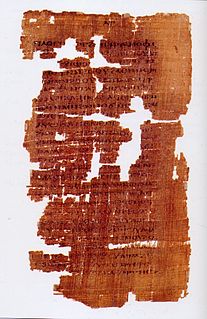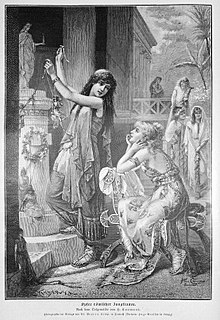Related Research Articles
Apollinarism or Apollinarianism is a Christological concept proposed by Apollinaris of Laodicea that argues that Jesus had a normal human body but a divine mind instead of a regular human soul. It was deemed heretical in 381 and virtually died out within the following decades.

The Book of Revelation is the final book of the New Testament, and consequently is also the final book of the Christian Bible. Its title is derived from the first word of the Koine Greek text: apokalypsis, meaning "unveiling" or "revelation." The Book of Revelation is the only apocalyptic book in the New Testament canon. Thus, it occupies a central place in Christian eschatology.

Christianity is an Abrahamic monotheistic religion based on the life and teachings of Jesus of Nazareth. Its adherents, known as Christians, believe that Jesus is the Christ, whose coming as the Messiah was prophesied in the Hebrew Bible, called the Old Testament in Christianity, and chronicled in the New Testament. It is the world's largest religion, with about 2.4 billion followers as of 2020. Christians make up a majority of the population in 157 countries and territories.

Colossae was an ancient city of Phrygia in Asia Minor, and one of the most celebrated cities of southern Anatolia. The Epistle to the Colossians, an early Christian text which identifies its author as Paul the Apostle, is addressed to the church in Colossae. A significant city from the 5th century BC onwards, it had dwindled in importance by the time of Paul, but was notable for the existence of its local angel cult. It was part of the Roman – and then Byzantine – province of Phrygia Pacatiana, before being destroyed in 1192/3 and its population relocating to nearby Chonae.

The Epistle to the Laodiceans is a lost letter of Paul the Apostle, the original existence of which is inferred from an instruction to the congregation in Colossae to send their letter to the believing community in Laodicea, and likewise obtain a copy of the letter "from Laodicea".
And when this letter has been read to you, see that it is also read before the church at Laodicea, and that you yourselves read the letter which will be forwarded from there.
Millennialism or chiliasm is a belief advanced by some religious denominations that a Golden Age or Paradise will occur on Earth prior to the final judgment and future eternal state of the "World to Come".

Paganism is a term first used pejoratively in the fourth century by early Christians for people in the Roman Empire who practiced polytheism. In the time of the Roman empire, individuals fell into the pagan class either because they were increasingly rural and provincial relative to the Christian population, or because they were not milites Christi. Alternate terms in Christian texts were hellene, gentile, and heathen. Ritual sacrifice was an integral part of ancient Graeco-Roman religion and was regarded as an indication of whether a person was pagan or Christian. Paganism has broadly connoted the "religion of the peasantry".

In Ancient Roman architecture, a basilica is a large public building with multiple functions, typically built alongside the town's forum. The basilica was in the Latin West equivalent to a stoa in the Greek East. The building gave its name to the architectural form of the basilica.
Monophysitism or Monophysism is a Christological term derived from μόνος monos, "alone, solitary" and φύσις physis, a word that has many meanings but in this context means "nature". It is defined as "a doctrine that in the person of the incarnated Word there was only one nature—the divine".

Latakia is the principal port city of Syria, as well as the capital of the Latakia Governorate. Historically, it has also been known as Laodicea in Syria or Laodicea ad Mare. In addition to serving as a port, the city is a manufacturing center for surrounding agricultural towns and villages. According to the 2004 official census, the population of the city is 383,786, Its population greatly increased as a result of the ongoing Syrian Civil War due to the influx of refugees from rebel held areas. It is the 4th-largest city in Syria after Aleppo, Damascus and Homs, and it borders Tartus to the south, Hama to the east, and Idlib to the north while Cape Apostolos Andreas, the most north-eastern tip of Cyprus is about 68 miles (109 km) away.

The Book of Baruch is a deuterocanonical book of the Bible in some Christian traditions. In Judaism and most forms of Protestant Christianity, it is considered not to be part of the Bible. It is named after Baruch ben Neriah, Jeremiah's well-known scribe, who is mentioned at Baruch 1:1, and has been presumed to be the author of the whole work. The book is a reflection of a late Jewish writer on the circumstances of Jewish exiles from Babylon, with meditations on the theology and history of Israel, discussions of wisdom, and a direct address to residents of Jerusalem and the Diaspora. Some scholars propose that it was written during or shortly after the period of the Maccabees.

Nahavand is a city and capital of Nahavand County, Hamadan Province, Iran. At the 2006 census, its population was 72,218, in 19,419 families. It is located south of Hamadan, east of Malayer and northwest of Borujerd. Occupied since prehistoric times, Nahavand was bestowed upon the House of Karen in the Sasanian period. During the Arab conquest of Iran, it was the site of the famous Battle of Nahavand.
The Laodicean Church was a Christian community established in the ancient city of Laodicea. The church was established in the Apostolic Age, the earliest period of Christianity, and is probably best known for being one of the Seven churches of Asia addressed by name in the Book of Revelation. Lukewarm followers, those who believe but do not walk according to the Spirit of the Lord

Laodicea on the Lycus was an ancient city built on the river Lycus (Çürüksu). It was located in the Hellenistic regions of Caria and Lydia, which later became the Roman Province of Phrygia Pacatiana. It is now situated near the modern city of Denizli, Turkey. In 2013 the archaeological site was inscribed in the Tentative List of World Heritage Sites in Turkey.
Manuel Komnenos Maurozomes was a Byzantine nobleman who in the aftermath of the Fourth Crusade tried to found an independent principality in Phrygia. His daughter, named Dawlat Raziya Khatun, was married to the Seljuk sultan Kaykhusraw I, and he eventually became governor (emir) of part of the region under Seljuk control; he was an influential figure in the Seljuk court until his death.
Anatolius of Laodicea, also known as Anatolios of Alexandria, became Bishop of Laodicea on the Mediterranean coast of Roman Syria in AD 268. He was not only one of the foremost scholars of his day in the physical sciences as well as in Aristotelean philosophy but also a great computist.
Attuda or Attouda was a Hellenistic city in ancient Caria and later in the Roman province of Phrygia Pacatiana. There are coins of the place with the epigraph Ἱερὰ Βουλὴ Ἀττουδέων, of the time of Augustus and later. The coins show that the Men Carus was worshipped there.
Preparation for the Gospel, commonly known by its Latin title Praeparatio evangelica, was a work of Christian apologetics written by Eusebius in the early part of the fourth century AD. It was begun about the year 313, and attempts to prove the excellence of Christianity over pagan religions and philosophies. It was dedicated to Bishop Theodotus of Laodicea.
Theodorias was a Byzantine province created in 528 by Emperor Justinian I and named in honour of his wife, the Empress Theodora.

Colossians 4 is the fourth chapter of the Epistle to the Colossians in the New Testament of the Christian Bible. Traditionally, it is believed to be written for the church in Colossae by Apostle Paul, with Timothy as his co-author, while he was in prison in Ephesus, although there were debatable charges that it is the work of a secondary imitator or that it was written in Rome. This chapter contains the final exhortations and greetings.
References
- Ed G. Wallen (2 February 2016). The Gospel of Matthew in Dialogue. WestBow Press. p. 247. ISBN 978-1-5127-2282-6.
- Frank Leslie Cross; Elizabeth A. Livingstone (2005). The Oxford Dictionary of the Christian Church. Oxford University Press. p. 1274. ISBN 978-0-19-280290-3.